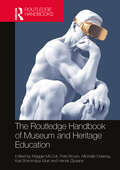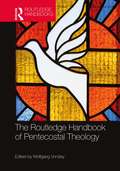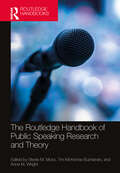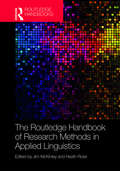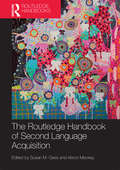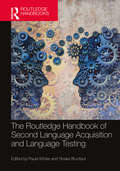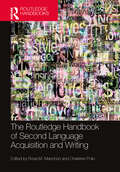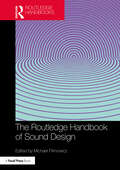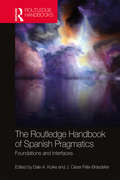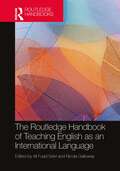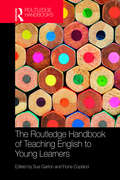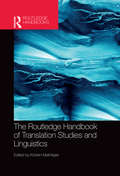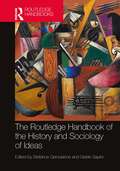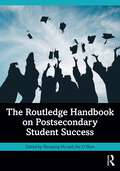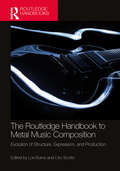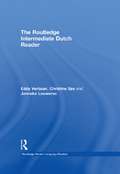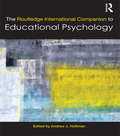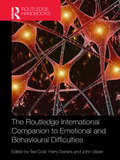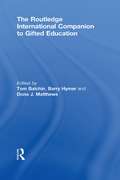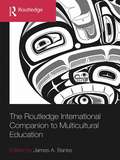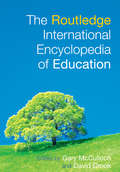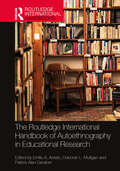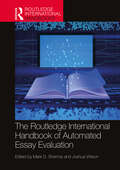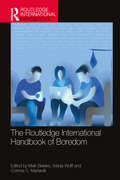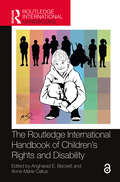- Table View
- List View
The Routledge Handbook of Museum and Heritage Education (Routledge Handbooks on Museums, Galleries and Heritage)
by Michelle Delaney Pete Brown Maggie McColl Karl Borromäus Murr Henrik ZipsaneThe Routledge Handbook of Museum and Heritage Education is a practical reference guide that shows how museums, galleries and heritage sites can offer opportunities for successful visitor engagement.Defining museums as all cultural sites that interpret collections and spaces for public education, understanding, and enjoyment, this volume argues that museum education has a central role in the development of policies, practices, and research for engagement. Including contributions from experts across the globe, the volume shows how these sites can continue to offer unique opportunities for social, physical, emotional, and academic engagement that are much needed to inform and empower museum visitors internationally. It also demonstrates how museums, galleries, and heritage sites can be utilised for the betterment and sustainability of our world and the societies we live in. Combining rich theory with innovative practice, this book provides a comprehensive analysis of museum and heritage education today.The Routledge Handbook of Museum and Heritage Education will be of interest to academics, students, and professionals who are based in the fields of museum education, heritage, adult and community education, cultural studies, social studies, psychology, and tourism.
The Routledge Handbook of Pentecostal Theology (Routledge Handbooks in Theology)
by Wolfgang VondeyResearch on Pentecostal and Charismatic Christianity has increased dramatically in recent decades, and a diverse array of disciplines have begun to address a range of elements of these movements. Yet, there exists very little understanding of Pentecostal theology, and it is not uncommon to encounter stereotypes and misperceptions. Addressing this gap in current research, The Routledge Handbook of Pentecostal Theology is an exceptional reference source to the key topics, challenges, and debates in this growing field of study and is the first collection of its kind to offer a comprehensive presentation and critical discussion of this subject. Comprising over forty chapters written by a team of international contributors, the Handbook is divided into five parts: Contextualizing Pentecostal Theology Sources Theological Method Doctrines and Practices Conversations and Challenges. These sections take the reader through a comprehensive introduction to what Pentecostals believe and how they practice their faith. Looking at issues such as the core teachings of Pentecostalism concerning Spirit baptism, divine healing, or eschatology; unique practices, such as spiritual warfare and worship; and less discussed issues, such as social justice and gender, each chapter builds towards a nuanced and global picture of the theology of the Pentecostal movement. The Routledge Handbook of Pentecostal Theology is essential reading for students and researchers in Pentecostal Studies, World Christianity, and Theology as well as scholars working in contemporary Religious Studies.
The Routledge Handbook of Public Speaking Research and Theory (Routledge Handbooks in Communication Studies)
by Stevie M. Munz, Tim McKenna-Buchanan, and Anna M. WrightProviding a comprehensive survey of the empirical research, theory, and history of public speaking, this handbook fills a crucial gap in public speaking pedagogy resources and provides a foundation for future research and pedagogical development.Bringing together contributions from both up-and-coming and senior scholars in the field, this book offers a thorough examination of public speaking, guided by research across six key themes: the history of public speaking; the foundations of public speaking; issues of diversity, equity, and inclusion; considerations of public speaking across contexts; assessment of public speaking; and the future of public speaking in the twenty-first century. The evidence-based chapters engage with a broad discussion of public speaking through a variety of viewpoints to demonstrate how subtopics are connected and fraught with complexity. Contributors explore public speaking in education, business and professional settings, and political contexts, and outline how skills learned through public speaking are applicable to interpersonal, small group, and business interactions.Reinforcing the relevance, importance, and significance of public speaking in individual, interpersonal, social, and cultural communication contexts, this accessibly written handbook will be an indispensable resource for public speaking instructors and program administrators. It will also be valuable reading for Communication Pedagogy and Introduction to Graduate Studies courses.
The Routledge Handbook of Research Methods in Applied Linguistics (Routledge Handbooks in Applied Linguistics)
by Heath Rose Jim McKinleyThe Routledge Handbook of Research Methods in Applied Linguistics provides a critical survey of the methodological concepts, designs, instruments and types of analysis that are used within the broad field of applied linguistics. With more than 40 chapters written by leading and emerging scholars, this book problematizes and theorizes applied linguistics research, incorporating numerous multifaceted methodological considerations and pointing to the future of good practice in research. Topics covered include: key concepts and constructs in research methodology, such as sampling strategies and mixed methods research; research designs such as experimental research, case study research, and action research; data collection methods, from questionnaires and interviews to think-aloud protocols and data elicitation tasks; data analysis methods, such as use of R, inferential statistical analysis, and qualitative content analysis; current considerations in applied linguistics research, such as a need for transparency and greater incorporation of multilingualism in research; and recent innovations in research methods related to multimodality, eye-tracking, and advances in quantitative methods. The Routledge Handbook of Research Methods in Applied Linguistics is key reading for both experienced and novice researchers in Applied Linguistics as well as anyone undertaking study in this area.
The Routledge Handbook of Second Language Acquisition (Routledge Handbooks in Applied Linguistics)
by Alison Mackey Susan M. GassThe Routledge Handbook of Second Language Acquisition brings together fifty leading international figures in the field to produce a state-of-the-art overview of Second Language Acquisition. The Handbook covers a wide range of topics related to Second Language Acquisition: language in context, linguistic, psycholinguistic, and neurolinguistic theories and perspectives, skill learning, individual differences, L2 learning settings, and language assessment. All chapters introduce the reader to the topic, outline the core issues, then explore the pedagogical application of research in the area and possible future development. The Routledge Handbook of Second Language Acquisition is an essential resource for all those studying and researching Second Language Acquisition.
The Routledge Handbook of Second Language Acquisition and Language Testing (The Routledge Handbooks in Second Language Acquisition)
by Paula Winke and Tineke BrunfautThis Handbook, with 45 chapters written by the world’s leading scholars in second language acquisition (SLA) and language testing, dives into the important interface between SLA and language testing: shared ground where researchers seek to measure second language performance to better understand how people learn their second languages. The Handbook also reviews how to best measure and evaluate the second language (L2) learners’ personal characteristics, backgrounds, and learning contexts to better understand their L2 learning trajectories. Taking a transdisciplinary approach to research, the book builds upon recent theorizing and measurement principles from the fields of applied linguistics, cognitive science, psychology, psycholinguistics, psychometrics, educational measurement, and social psychology. The Handbook is divided into six key sections: (1) Assessment concepts for SLA researchers, (2) Building instruments for SLA research, (3) Measuring individual differences, (4) Measuring language development, (5) Testing specific populations, and (6) Measurement principles for SLA researchers.
The Routledge Handbook of Second Language Acquisition and Writing (The Routledge Handbooks in Second Language Acquisition)
by Rosa M. ManchónThis unique state-of-the-art volume offers a comprehensive, systematic discussion of second language (L2) writing and L2 learning. Led by experts Rosa Manchón and Charlene Polio, top international scholars synthesize and contextualize the salient theoretical approaches, methodological issues, empirical findings, and emerging themes in the connection between L2 writing and L2 learning, and set the future research agenda to move the field forward. This will be an indispensable resource for scholars and students of second language acquisition (SLA), applied linguistics, education, and composition studies.
The Routledge Handbook of Sound Design
by Michael FilimowiczThe Routledge Handbook of Sound Design offers a comprehensive overview of the diverse contexts of creativity and research that characterize contemporary sound design practice. Readers will find expansive coverage of sound design in relation to games, VR, globalization, performance, soundscape and feminism, amongst other fields.Half a century since its formal emergence, this book considers sound design in a plethora of practical contexts, including music, film, soundscape and sonification, as well as the emerging theoretical and analytical approaches being used in scholarship on the subject. The Routledge Handbook of Sound Design tracks how ideas and techniques have migrated from one field to the next, as professionals expand the industry applications for their skills and knowledge, and technologies produce new form factors for entertainment and information.Collectively, the chapters included in this volume illustrate the robustness and variety of contemporary sound design research and creativity, making The Routledge Handbook of Sound Design essential reading for students, teachers, researchers and practitioners working on sound design in its many forms.
The Routledge Handbook of Spanish Pragmatics: Foundations and Interfaces (Routledge Spanish Language Handbooks)
by J. César Félix-Brasdefer Dale A. KoikeThe Routledge Handbook of Spanish Pragmatics is the first volume to offer a comprehensive overview of advances in Spanish Pragmatics, addressing different types of interaction and the variables, both social and linguistic, that can affect them. Written by a diverse set of experts in the field, the handbook unifies two major approaches to the study of pragmatics, the Anglo-American and European Continental traditions. Thirty-three chapters cover in detail both pragmatic foundations (e.g. speech act theory, implicature and relevance, deixis) and interfaces with other concepts, including: • Discourse • Variation; Culture and interculture • (Im)politeness; humor • Learning contexts and teaching • Technology This is an ideal reference for advanced undergraduate and postgraduate students, and researchers of Spanish language and linguistics.
The Routledge Handbook of Teaching English as an International Language (Routledge Handbooks in Applied Linguistics)
by Nicola Galloway Ali Fuad SelviThe Routledge Handbook of Teaching English as an International Language provides a ground-breaking overview of the research on the global spread of English with pedagogical implications. Bringing together a number of key scholars and scholarly discussions on various aspects of teaching English as an International Language (TEIL), this handbook directs research in this field to help inform the much-needed paradigm shift in ELT away from idealized native English-speaking norms.Reframing English language, language teaching, and teacher education to match the new sociolinguistic landscape of the 21st century, this handbook analyzes this topic in seven key areas: Theoretical considerations Major frameworks and proposals Principles and practices of teaching and assessing English Innovative approaches, varied contexts, and transformative practices Diverse teaching settings and populations Teacher education and professional development Research developments and future directions The Routledge Handbook of Teaching English as an International Language is essential reading for scholars and students researching in the areas of World Englishes, English as a lingua franca, English as an international language, Global Englishes, ELT, sociolinguistics, and critical applied linguistics.
The Routledge Handbook of Teaching English to Young Learners (Routledge Handbooks in Applied Linguistics)
by Fiona Copland Sue GartonThe Routledge Handbook of Teaching English to Young Learners celebrates the ‘coming of age’ for the field of research in primary-level English Language Teaching. With 32 chapters written by international scholars from a wide geographical area including East Africa, Mexico, the South Pacific, Japan, France, the USA and the UK, this volume draws on areas such as second language acquisition, discourse analysis, pedagogy and technology to provide: An overview of the current state of the field, identifying key areas of TEYL. Chapters on a broad range of subjects from methodology to teaching in difficult circumstances and from Content and Language Integrated Learning (CLIL) to gaming. Suggestions of ways forward, with the aim of shaping the future research agenda of TEYL in multiple international contexts. Background research and practical advice for students, teachers and researchers. With extensive guidance on further reading throughout, The Routledge Handbook of Teaching English to Young Learners is essential reading for those studying and researching in this area.
The Routledge Handbook of Translation Studies and Linguistics (Routledge Handbooks in Translation and Interpreting Studies)
by Kirsten MalmkjærThe Routledge Handbook of Translation Studies and Linguistics explores the interrelationships between translation studies and linguistics in six sections of state-of-the-art chapters, written by leading specialists from around the world. The first part begins by addressing the relationships between translation studies and linguistics as major topics of study in themselves before focusing, in individual chapters, on the relationships between translation on the one hand and semantics, semiotics and the sound system of language on the other. Part II explores the nature of meaning and the ways in which meaning can be shared in text pairs that are related to each other as first-written texts and their translations, while Part III focuses on the relationships between translation and interpreting and the written and spoken word. Part IV considers the users of language and situations involving more than one language and Part V addresses technological tools that can assist language users. Finally, Part VI presents chapters on the links between areas of applied linguistics and translation and interpreting. With an introduction by the editor and an extensive bibliography, this handbook is an indispensable resource for advanced students of translation studies, interpreting studies and applied linguistics.
The Routledge Handbook of the History and Sociology of Ideas
by Stefanos GeroulanosThe Routledge Handbook of the History and Sociology of Ideas establishes a new and comprehensive way of working in the history and sociology of ideas, in order to obviate several longstanding gaps that have prevented a fruitful interdisciplinary and international dialogues. Pushing global intellectual history forward, it uses methodological innovations in the history of concepts, gender history, imperial history, and history of normativity, many of which have emerged out of intellectual history in recent years, and it especially foregrounds the role of field theory for delimiting objects of study but also in studying transnational history and migration of persons and ideas. The chapters also explore how intellectual history crosses the study of particular domains: law, politics, economy, science, life sciences, social and human sciences, book history, literature, and emotions.
The Routledge Handbook on Postsecondary Student Success
by Shouping Hu Joe O’SheaThe Routledge Handbook on Postsecondary Student Success offers a comprehensive and authoritative examination of student success in postsecondary education.This handbook addresses critical issues in student success, such as student engagement, mental health, and degree completion to provide valuable insights on promoting student success holistically and systematically, for students from different backgrounds or in different institutional contexts. It also offers a robust understanding of how to study and enhance student success by exploring the significance of data, analytics, and various research methods. Using evidence-based insights and practical strategies and offering key concepts, theories, and best practices, this handbook serves as a guide to promoting overall student success and closing success gaps.With forty chapters authored by leading thinkers in higher education, this handbook is an indispensable resource for postsecondary administrators, faculty, staff, practitioners, graduate students, researchers, and policymakers. It informs and inspires efforts to improve student outcomes and create more supportive environments, so students everywhere can succeed and flourish.
The Routledge Handbook to Metal Music Composition: Evolution of Structure, Expression, and Production (Routledge Music Handbooks)
by Lori Burns Ciro ScottoThe Routledge Handbook to Metal Music Composition: Evolution of Structure, Expression, and Production examines metal music composition as a distinct practice that combines a complex array of formal musical, expressive, and technological elements. Reaching beyond the limitations of applying common-practice theories of tonality to metal, this volume brings together a wide range of established and emerging scholars to address the building blocks of metal composition in the context of metal’s subgenres and evolution over time. Together, the chapters provide a holistic theoretical framework for understanding the distinctive compositional features of metal.With contributions from an international group of experts, the handbook is organized into four parts around major themes:• Structures, including form, riff, harmony, rhythm, and meter• Expressions and Techniques: Instruments• Expressions and Techniques: Voices• Productions, addressing the role of gear, capturing, processing, and mixing technologies.The contributors examine and discuss these elements with the goal of building an understanding of metal music composition that can also function as a manual for composing metal music. Providing a comprehensive overview of the unique musical elements of metal, this handbook is an essential resource for scholars and students across popular music studies, musicology, creative music performance and composition, songwriting, and production studies, as well as for anyone interested in understanding metal from the perspective of composition.
The Routledge Intermediate Dutch Reader
by Eddy Verbaan Christine Sas Janneke LouwerseThe Routledge Intermediate Dutch Reader has been specially designed for upper intermediate learners of Dutch and comprises a broad selection of graded readings. The readings are taken from a range of contemporary Dutch writing, from newspapers and magazines through to specialist journals and the internet. The texts have been specifically selected to ensure students receive maximum exposure to topics pertaining to Dutch language, culture and society, making this Reader an enjoyable and stimulating resource with a meaningful cultural context. Each reading is fully supported by: a general introduction a vocabulary list with example sentences a number of text comprehension questions and extensive vocabulary exercises with model answers provided in the key a wide variety of speaking exercises relevant to the vocabulary and topic at hand a number of internet research tasks a short list of suggested further reading. A full glossary of words, an overview of fixed word combinations and an outline of irregular verbs are also available as free downloads at http://www.routledge.com/books/details/9780415550086/ Suitable for both class use and independent study, The Routledge Intermediate Dutch Reader is an essential tool for facilitating vocabulary learning and increasing reading proficiency.
The Routledge International Companion to Educational Psychology
by Andrew J. HollimanThe Routledge International Companion to Educational Psychology brings together expert practitioners, researchers, and teachers from five continents to produce a unique and global guide to the core topics in the field. Each chapter includes coverage of the key thinkers, topic areas, events, and ideas that have shaped the field, but also takes the reader beyond typical textbook material and into engagement with current issues, cutting-edge research and future directions in the field of educational psychology from an international perspective. With over 30 chapters, the volume is divided into four themed sections: ‘An introduction to educational psychology’, ‘How children learn and develop’, ‘Issues concerning the assessment of children’ and ‘Identifying and meeting the needs of children with learning difficulties’. Covering the key issues and fundamental strands of educational psychology The Routledge International Companion to Educational Psychology aims to provide the reader with knowledge of: educational psychology (history, child rights, and practice); factors which influence children’s learning and development; issues to do with assessment (a key aspect of educational psychology); special educational needs (identification and how to meet their needs); the key thinkers, events, and ideas that have shaped the field; the core topics across educational psychology in an accessible manner; cutting edge research including recent research evidence and theory; future directions in the field of educational psychology; educational psychology from an international perspective. The book is conceived for both student and researcher use, and considers the implications for educational psychology practice in all sections. It will be highly beneficial for both students and lecturers on Education Studies and Psychology undergraduate courses, as well as combined undergraduate degrees .
The Routledge International Companion to Emotional and Behavioural Difficulties
by Harry Daniels Ted Cole John VisserResponding to disruptive or troubled pupils with emotional and behavioural difficulties (EBD) remains a highly topical issue. The challenges these children present relate to wider issues of continuing political concern: the perceived declining discipline in schools; school and social exclusion; the limits to inclusion for children with special needs; increasing mental health difficulties in children; youth crime and parenting skills. It’s little wonder that the 'EBD' (often known as ‘BESD’ or ‘SEBD’) category is one of the most common forms of SEN around the world. This topical and exhaustively-researched Companion examines the difficulties of defining EBD, and the dangers of allocating this imprecise label to children. Bringing together the work of contributors from fifteen countries and across four continents, this book features the research of leading experts in the global field of EBD, who discuss and debate educators’ key concerns by: looking at the overlaps between EBD, ADHD and mental health difficulties; outlining the types of appropriate schooling for children with EBD; urging readers to look beyond pupils’ challenging behaviour in order to understand and respond to the social, biological and psychological causation; considering the key areas of assessment, whole-school and targeted approaches that help pupils with EBD in mainstream and in special settings; outlining helpful work with families, the crucial contribution of effective multi-agency working and the importance of supporting and developing teachers who work with challenging pupils. Containing contrasting views on controversial topics, this Companion’s approachable style makes it an essential reference book for academics, policy makers, practitioners, educators and students who are working towards a higher degree in education.
The Routledge International Companion to Gifted Education
by Barry Hymer Tom Balchin Dona J. MatthewsThe Routledge International Companion to Gifted Education is a ground-breaking collection of fully-referenced chapters written by many of the most highly-respected authorities on the subject from around the world. These fifty contributors include distinguished scholars who have produced many of the most significant advances to the field over the past few decades, like Joseph Renzulli and Robert Sternberg, alongside authorities who ask questions about the very concepts and terminology embodied in the field – scholars such as Carol Dweck and Guy Claxton. This multi-faceted volume: highlights strategies to support giftedness in children, providing ideas that work and weeding out those that don’t; is written in jargon-free language in an easy-to use themed format; is the most authoritative collection of future-focused views, ideas and reflections, practices and evaluations yet produced; includes chapters dealing with the major controversies and concerns in the field today, from the problems of identification to changing understandings of giftedness and creativity. The international aspect of the Companion, and its juxtaposition of points of view – whereby chapters are deliberately positioned and accompanied by editorial commentary to highlight the contrasts with each other – ensures that different views are addressed, allowing the reader to absorb and reflect upon the many perspectives on each issue. The Companion is a guide to the new ideas and controversies that are informing gifted education discussion and policy-making around the world. It is a first class resource to students and researchers alike.
The Routledge International Companion to Multicultural Education (Routledge International Handbooks of Education)
by James A. BanksThis volume is the first authoritative reference work to provide a truly comprehensive international description and analysis of multicultural education around the world. It is organized around key concepts and uses case studies from various nations in different parts of the world to exemplify and illustrate the concepts. Case studies are from many nations, including the United States, the United Kingdom, Canada, Australia, France, Germany, Spain, Norway, Bulgaria, Russia, South Africa, Japan, China, India, New Zealand, Malaysia, Singapore, Indonesia, Brazil, and Mexico. Two chapters focus on regions – Latin America and the French-speaking nations in Africa. The book is divided into ten sections, covering theory and research pertaining to curriculum reform, immigration and citizenship, language, religion, and the education of ethnic and cultural minority groups among other topics. With fortynewly commissioned pieces written by a prestigious group of internationally renowned scholars, The Routledge International Companion to Multicultural Education provides the definitive statement on the state of multicultural education and on its possibilities for the future.
The Routledge International Encyclopedia of Education
by David Crook Gary McCullochThe Routledge International Encyclopedia of Education is a unique and major resource for the field of education. It is a comprehensive, single-volume work, arranged alphabetically and comprising around 600 entries. The entries range from definitions of key educational concepts and terms to biographies of key educators and specially written substantial essays on major educational topics. The volume includes authoritative and critical commentary on historical and contemporary themes; examinations of continuities, changes and emerging issues; and discussions of the educational traditions and features of major countries and continents. The following special features are also included: Unrivalled coverage of education in a single volume Entries by leading international educational researchers Contributors drawn from all over the globe, including Australia, Brazil, Canada, China, Finland, India, Israel, Japan, New Zealand, South Africa, the United Kingdom and the United States A distinguished international advisory board Fully cross-referenced and indexed Suggestions for further reading Offering insight into the world of education in an interesting, informed and sometimes provocative way, The Routledge International Encyclopedia of Education is an invaluable work of reference for educators, students, researchers and policy makers in education and related fields internationally.
The Routledge International Handbook of Autoethnography in Educational Research (Routledge International Handbooks)
by Patrick Alan Danaher Deborah L. Mulligan Emilio A. AntelizThe Routledge International Handbook of Autoethnography in Educational Research presents diverse and rigorous contemporary research at the intersection between autoethnography and educational research. The handbook investigates the bidirectional connection between autoethnography and educational research in relation to four themes: enhancing teaching and teacher education with autoethnography; enlarging doctoral study and supervision with autoethnography; conducting identity work and relationship-building via autoethnography; and promoting social justice through autoethnography. In addition to the synthesising introduction and conclusion chapters, the 27 main chapters in the handbook cover current research from Africa, Aotearoa New Zealand, Australia, Bangladesh, Canada, Spain, the United Kingdom, the United States and Venezuela. The chapters present novel applications of several key concepts and research methods, including activism, arts-based research, critical reflection, decolonising feminism, doctoral study and supervision, hybrid identities, Indigenous research, migrant education, racism, researcher self-efficacy, teacher identity, visual autoethnography and writing as voice. This book will be of use to all researchers, and doctoral and Masters students, using qualitative and autoethnographic methods in Education and related fields.
The Routledge International Handbook of Automated Essay Evaluation (Routledge International Handbooks)
by Joshua Wilson Mark D. ShermisThe Routledge International Handbook of Automated Essay Evaluation (AEE) is a definitive guide at the intersection of automation, artificial intelligence, and education. This volume encapsulates the ongoing advancement of AEE, reflecting its application in both large-scale and classroom-based assessments to support teaching and learning endeavors.It presents a comprehensive overview of AEE's current applications, including its extension into reading, speech, mathematics, and writing research; modern automated feedback systems; critical issues in automated evaluation such as psychometrics, fairness, bias, transparency, and validity; and the technological innovations that fuel current and future developments in this field. As AEE approaches a tipping point of global implementation, this Handbook stands as an essential resource, advocating for the conscientious adoption of AEE tools to enhance educational practices ethically. The Handbook will benefit readers by equipping them with the knowledge to thoughtfully integrate AEE, thereby enriching educational assessment, teaching, and learning worldwide.Aimed at researchers, educators, AEE developers, and policymakers, the Handbook is poised not only to chart the current landscape but also to stimulate scholarly discourse, define and inform best practices, and propel and guide future innovations.
The Routledge International Handbook of Boredom (Routledge International Handbooks)
by Maik Bieleke Wanja Wolff Corinna S. MartarelliThis comprehensive text is a unique handbook dedicated to research on boredom. The book brings together leading contributors from across three continents and numerous fields to provide an interdisciplinary exploration of boredom, its theoretical underpinnings, its experiential properties, and the applied contexts in which it occurs.Boredom is often viewed as a mental state with little utility, though recent research suggests that it can be a powerful motivator of human behavior that shapes our actions in many ways. The book examines boredom from a range of perspectives and is comprised of three parts. Part I delves into the theoretical approaches to boredom, presenting methods for its measurement, explaining when and why boredom occurs, and scrutinizing the impact it has on our behavior. Part II focuses on the psychological and neural properties of boredom and its associations with a multitude of mental and interpersonal processes, such as self-control, mind-wandering, flow, and aggression. Part III presents boredom in practical contexts like school and work, and sheds light on its role for health-related behaviors, psychosocial well-being, and aesthetic experiences. The book concludes by summarizing the state of boredom research, identifying promising areas for future research, and providing directions for how research on boredom can be advanced. As the authoritative book on boredom, this handbook is an essential resource for students and researchers of psychology, sociology, education, sport science, and computer science.
The Routledge International Handbook of Children's Rights and Disability (Routledge International Handbooks)
by Angharad E. Beckett Anne-Marie CallusThis handbook provides authoritative and cutting-edge analyses of various aspects of the rights and lives of disabled children around the world. Taking the UN Convention on the Rights of Persons with Disabilities (CRPD) and the UN Convention of the Rights of the Child (CRC) as conceptual frameworks, this work appraises the current state of affairs concerning the rights of disabled children across different stages of childhood, different life domains, and different socio-cultural contexts. The book is divided into four sections: Legislation and Policy Children’s Voice The Life Course in Childhood Life Domains in Childhood Comprised of 37 newly commissioned chapters featuring analyses of UN documents and case studies from Australia, Brazil, Ethiopia, Hong Kong, Italy, the Netherlands, Norway, Papua New Guinea, Serbia, South Africa, Spain, Sweden, the United Kingdom, the United States, and Vanuatu, its multidisciplinary approach reflects the complexities of the lives of disabled children and the multifarious nature of the strategies needed to ensure their rights are upheld. It will be of interest to researchers and students working in disability studies, education, allied health, law, philosophy, play studies, social policy, and the sociology of childhood. It will also be a valuable resource for professionals/practitioners, allowing them to consider future directions for ensuring that disabled children’s rights are realised and their well-being and dignity are assured.
